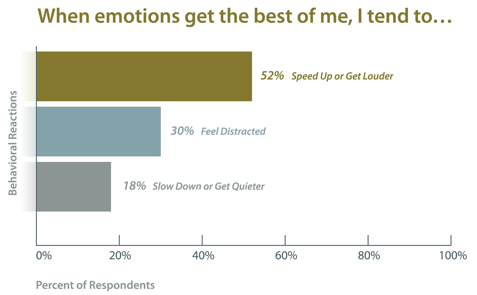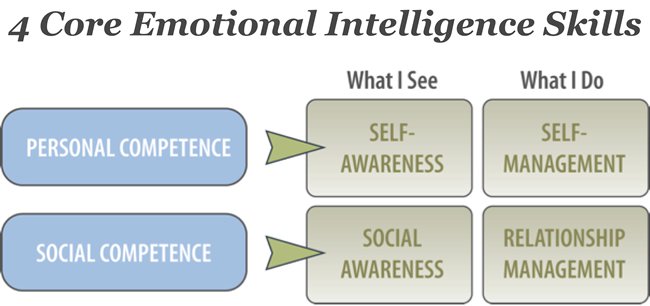Four old friends head to dinner at their favorite restaurant to celebrate. After they consume their selections, with laughter and raised voices, the waiter heads over to clear the empty plates. Smiling as he catches the friends’ heightened mood, he offers to show them the evening’s desserts. One friend says, “Absolutely! Let’s keep the celebration going.”
Returning with a tray-o-delights in hand, the waiter steadies the platter on his arm to be sure all eyes take in the view. Finally, another friend says, “Look how rich they all are. I’m trying to cut back. Just look at that one!” With a knowing look and a nod, the waiter suggests, “Just skip breakfast in the morning.” Chuckles resound, and four orders of “that one” are placed. The celebration continues for the friends, the waiter, and the restaurant, because the waiter picked up on the group’s mood and ran with it. The waiter’s actions required emotional intelligence (EQ)—a set of skills that, when used intentionally, boost sales from the golf course, to the boardroom . . . even the table.
Emotional Intelligence Drives Sales
Let’s consider how emotions factored into our waiter up-selling dessert to four friends who were already full. First, moods are catchy when you notice them. The waiter approached a group of laughing people enjoying the food and each other. He noticed and reflected their joy with a smile (strengthening rapport) and offered to continue the celebration with more food. He found a need and met the need. To the uninformed, things may seem like a done deal at this point, but selling just isn’t that easy. Pangs of guilt begin bubbling up from the diners’ full bellies, and their buoyant mood is suddenly in conflict with feelings of apprehension around ordering dessert. Our astute waiter picks up on his customers’ clashing moods, and knows all too well that worry over calories may just end the party. He’s quick to empathize with the friends’ dilemma, and— with one simple, lighthearted suggestion—squashes their concern over extra calories and switches their focus to the great time they’re having.
How Emotional Reactions Can Hurt the Sales Process
Every sales person understands all too well that customers present only about five steps between hearing “Hello” and saying “Sold”!
There are just five steps to success:
- Build the relationship
- Find the need
- Meet the need
- Jump the hurdles
- Ask for the sale
Yet why do five little steps sometimes feel like the journey of a lifetime with some customers? The answer lies in how our brains are wired. Sales people, like all people, are not logical creatures and neither are their customers. Sales people have moments when they feel discouraged, anxious, pressured, distracted, and even overzealous. When any of these emotions surface for either party, the feelings can take over the process and stall the sale or steer it off track. On a sales rep’s best day, he or she feels optimistic, patient, energetic, and confident. Customers, too, have days when they feel rushed, skeptical, hesitant to move forward, or even overzealous and naively excited. Picture a frazzled or distracted waiter trying to offer dessert to our four friends. This one won’t notice their joy and won’t smile, may rush the view of the desserts, and when the skeptical friend speaks up, the frazzled waiter will say, “All right then, anyone else?” The distracted waiter will say, “May I bring you the bill then?” Emotions can hurt sales.
When we asked sales professionals how they react when their emotions take over, sales professionals say they behave in one of three ways: they become louder/faster (52% of behavioral reactions), they become slower/quieter (18%), or they become distracted altogether (30%). While one sales professional gets amped by her emotions (“I talk faster”), the next sales person gets shut down by them (“I become tongue-tied”), and the next befuddled by them (“My thoughts fray”).

None of these reactions help make the sale. What does make the sale is the relationship. Customers look for the sales person who reads and understands their needs, someone who can be trusted, and someone who focuses on customers, not on himself or herself. Just like jumping the hurdles to the sale itself, sales professionals have to jump the emotional hurdles in the sales process, their own and their customers’. The great sales person has to have emotional intelligence.
How Emotional Intelligence Skills Help Make the Sale
Those sales professionals who can spot their emotions when they happen, understand them, and manage them well will be the ones who find it in them to manage their schedule well, remain positive when their clients aren’t, and make one more sales call when everything says it will be tough. These sales professionals’ ability to be self- aware and self-manage will help them stop formulating their next pitch while the customer is talking. They’ll become great listeners, and they’ll hear what the customer is really saying. This makes spotting the pitch that will resonate and stick so much easier and more authentic. Good personal competence skills, the first half of a high EQ, will help sales people self-motivate, will prevent them from getting in their own way, and will give them the confidence to ask for the sale.

Social competence skills, the second half of a high EQ, help sales professionals become great at forming and strengthening authentic relationships with their client. Not only will sales professionals establish rapport quicker by learning to make the most of their natural communication style, but they’ll also be more curious about what’s important to their clients and why. Social awareness skills enable sales professionals to get to know the client’s personality style. The high-EQ sales rep builds trust over time because she understands and addresses clients’ hesitations. She’s skilled at reading not only what is said but also how her client says it or what’s not said. She discovers what to talk about and when. These little things are what form deeper longer- term relationships with customers. While finding out her client’s true need, meeting that need, and jumping any hurdles, she’ll hold off assuming she’s nailed the sale and gather more and better information at each step. She’ll know when to recognize the moment to ask for the sale because emotional intelligence skills will equip her with the level of sophistication required for becoming a star sales person—one who is truly client-centered.
The EQ Resource for Sales Professionals
Emotional Intelligence 2.0 is the first book to offer sales professionals a complete, step-by-step program for increasing emotional intelligence using the four core EQ skills—self-awareness, self-management, social awareness, and relationship management. The book’s smooth narrative style turns rigorous research into memorable stories and 66 practical strategies that any sales rep can pull off the shelf and use to his or her advantage in that next important client visit.
Each book provides an access code to a new, enhanced online edition of the world’s best-selling emotional intelligence test, the Emotional Intelligence Appraisal. With a fill-in EQ Action Plan included, sales reps can discover their EQ skill scores today and see which of the book’s 66 strategies will increase each sales rep’s emotional intelligence the most. Additionally, it allows sales reps to test a second time to measure how much their EQ has increased after working on their EQ action plan. Don’t miss providing your sales professionals with the opportunity to develop one of the most important tools in their sales toolkit.
EQ and the Bottom Line
If your company has not yet invested in emotional intelligence skills as a key competitive advantage for your sales force, consider these numbers . . .
- At L’Oréal, sales professionals hired based on their emotional intelligence outperformed their peers by $91,370 at the end of the first year.1
- In a national insurance company, insurance sales agents weak in specific emotional intelligence skills such as self-confidence, initiative, and empathy sold average premiums of $54,000, while those who were strong sold average premiums of $114,000.2
- 90% of top performers score high in EQ, and EQ is twice as important as IQ in helping people achieve their personal and professional goals.
Our clients find time and time again that teaching their salespeople to both recognize and respond to their emotions and the emotions of their customers makes a tangible difference in commissions and the companies’ bottom lines.
Here are just a few strategies from the Emotional Intelligence 2.0 that will help your sales professionals improve results at each stage of the sales process.

1Spencer, L., McClelland, D. & Kelner, S. (1997). Competency assessment methods: History and state of the art. Boston: Hay/McBer.
2Goleman, D., Boyatzis, R., McKee, A. (2002). Primal Leadership: Learning to lead with emotional intelligence. Boston: Harvard Business School Press.
ABOUT THE AUTHOR:
Jean Greaves, Ph.D.
Dr. Jean Greaves is the co-author of the bestselling Emotional Intelligence 2.0 and the cofounder and CEO of TalentSmartEQ, the world’s leading provider of emotional intelligence tests, emotional intelligence training, and executive coaching. Her bestselling emotional intelligence books have been translated into 25 languages and are available in more than 150 countries. Dr. Greaves leverages her twenty-five year track record of consulting, speaking and applied research. She has written for, or been covered by, Newsweek, Fortune, Forbes, The Wall Street Journal, The Washington Post, and The Harvard Business Review.